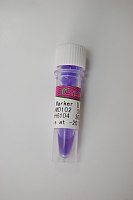Rapid Methods for Detection of Polymorphic Markers in Genomic DNA
互联网
539
The identification and use of restriction fragment length polymorphisms (RFLPs) (1 ) detected by Southern blotting (2 ), using known or anonymous DNA probes, has provided the means for development of genetic markers that are distributed throughout the genome and that form the basis for linkage maps (3 ,4 ). The approach used to identify new RFLPs with a given probe has been to analyze a number of genomic DNA samples from unrelated individuals, digested with a range of restriction enzymes. For example, Aldridge et al. (5 ) were able to detect RFLPs in five probes out of a total of 15 tested by assaying 23 restriction digests of three genomic DNA samples. This approach is inefficient, however, as it only detects sequence changes that alter the restriction sites being assayed, plus deletions or insertions that are large enough to alter restriction fragment sizes.








